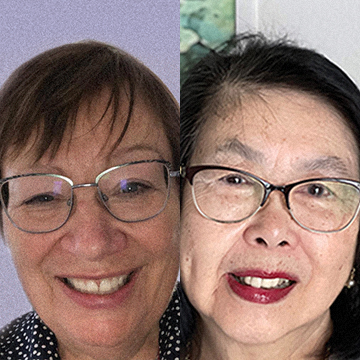“Equity, Diversity and Inclusion consultants Drs. Catherine McGregor and Grace Wong Sneddon were contracted in 2022 to dive deeply into how–and how well–MTS has provided access, voice and safety to all members and staff of the organization. The result is compelling. The data and recommendations that flow from them provide an unvarnished look into the very real challenges we face as well as the opportunities ahead, should we be bold and brave enough to grasp them. It is imperative that members and staff alike engage with these findings and continue the dialogue, as together we digest the information and determine the way forward.”
– Dr. Danielle Fullan Kolton, Executive Director, MTS
In accordance with a 2021 MTS Provincial Council resolution, the Society undertook a comprehensive organizational equity, diversity and inclusion (EDI) scan, the work of which unfolded throughout 2021 and 2022.
This included an internal audit of the staffing and leadership demographics, organizational policies, practices, and experiences of the Society, along with an external audit of membership and leadership demographics, organizational policies and practices, of other teacher unions in Canada, and the experiences of the membership. EDI consultants Dr. Catherine McGregor and Dr. Grace Wong Sneddon were contracted to complete the work.The consultants submitted a report to the 2023 MTS Provincial Council, outlining the process and the findings of extensive research conducted. The 148-page report is available in full and executive summary formats at mbteach.org. Members and staff are strongly encouraged to read the information and reflect on how MTS can move forward, armed with this research, to evolve the organization meaningfully and effectively.
Internal Scan
An internal scan is designed to look specifically at the methods, practices, policies, and procedures through which the commitments to organizational vision are realized. Policies were a significant element in this scan and referred to in the report.
They include:
1. Operational policies and procedures for employees (MTS as Employer)
2. Handbook policies for members (Policy I and Policy II) (MTS as Advocate/MTS as Governance)
External Scan
An external scan offers a bird’s-eye view of the organizational landscape and gives some scope to consider the breadth and range of approaches various organizations may have taken in their organizational plans or strategies.
We have taken an approach designed to situate the scans within the current Canadian landscape: we provide MTS with both a historical and contemporary lens through which to understand basic equity affirming systems and processes. These histories and provincial and federal frameworks provide details which can enable a deepened understanding of how organizations have typically responded to issues of equity and inclusion.
As academic researchers and equity consultants, we know that many of the systemic roots which have shaped Canadian organizations come from these histories, beliefs, and understandings, often developed over time in colonial contexts. We also know that building on legislative principles and human rights provides sound foundations for actions now and into the future.
We also believe that this broad environmental scan of legislation, trade union and teacher organizational histories will help you to articulate your vision, mission, and values. This information may also help you devise some guiding principles which can be used in creating plans for the dismantling of systemic inequities throughout MTS, developing good governance practices and achieving organizational leadership.
The Members Speak
An online survey, offered in English and French, focus groups and individual interviews were conducted from August to December, 2022. In total, there were 1,105 member survey participants, 22 members participated in individual interviews, and 33 focus groups were conducted, two of which were offered by a French facilitator. All data was collected anonymously. Transcripts of all focus group interviews were reviewed for personal identifiers, and these were removed prior to creating thematic summaries so that no individual could be identified.
Using quantitative data standards, we calculated the validity of the survey by considering the population size, the confidence level and margin of error to establish a minimum sample size. In this case, a sample of about 1,000 individuals meets the industry standard for validity of the data, assuming about a 3% margin of error and an overall population of approximately 16,600 members; we met the 95% confidence level.
The survey offered a good initial benchmark from which to measure and assess member knowledge, perspectives, and beliefs, and which we can confidently say represents the overall MTS population. Many themes were repeated across the interviews–a strong sign of authenticity.
Implementation Recommendations
We recognize that there are many diverse topics canvassed in the overall report, and navigating through the many observations and issues identified will seem daunting. We also acknowledged throughout this report the complex roles that MTS plays as an organization: they are employer to their staff, an advocate for their members in their work as educators, and act as organizational leaders tasked with managing the organization governance systems. This complexity means the planning processes will need to carefully consider what actions are needed for each organizational component.
The Work Ahead
The data provides a window onto the landscape on which MTS operates, the challenges ahead, and, encouragingly, the capacity for constructive, meaningful change. We hope this focus on background information on equity work and quantitative and qualitative research will be of value as you consider your path forward. Log onto your MTS MyProfile account to read the full EDI report.
– Originally published in the Spring 2023 issue of the MB Teacher
Read More MB Teacher Features Here!

Dr. Catherine McGregor and Dr. Grace Wong Sneddon are academic researchers and knowledge mobilization professionals from the University of Victoria. Both have been engaged in university sector initiatives designed to create more equitable campuses and ensure diversity and inclusion are principles which drive organizational culture and workplace practices. They also provide consulting and research support to not-for-profit organizations in educational and social services sectors.
